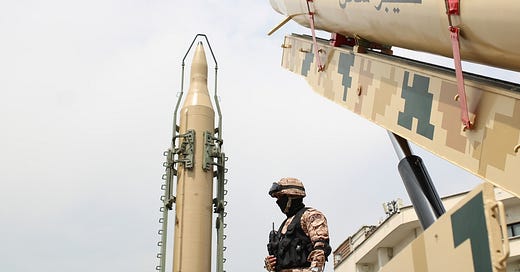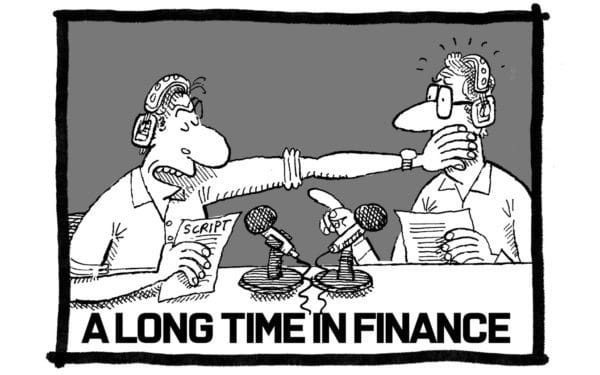A weakened Iran launches attack on Israel
Today's missile attack is one that Tehran was reluctant to conduct.
"This attack will have consequences", vowed IDF spokesperson Daniel Hagari, after missiles rained down on Israel tonight, in the second ever direct aerial attack to be launched by Iran, writes Caitlin Allen.
Washington - which first warned this afternoon that Tehran was preparing to "imminently launch a ballistic missile attack against Israel” - has also insisted that the onslaught “will carry severe consequences for Iran”.
So far, the damage appears minimal. No serious injuries have been reported and Israeli authorities have told residents that they can now leave their bomb shelters.
Despite what today's fresh barrage of missiles might imply, Iran does not want to get dragged into a direct conflict. It would much rather leave its various proxy groups in the Middle East to confront Israel.
Today's attack is one that Tehran was reluctant to launch. But Iran’s supreme leader, Ali Khamenei, has been pushed into a corner by an adversary willing to take increasingly bold gambles.
Back in April, facing pressure to respond to Israel’s attack on its embassy in Syria, Tehran launched its first ever direct attack on Israel. Yet even this big barrage of missiles - 99 per cent of which were intercepted by Israel and its allies - was calibrated to avoid significant escalation.
Indeed, as Tim Marshall wrote in Reaction, “launching 300 missiles and drones looked good on Iranian television but, if you really want to hurt your enemy, you don’t give them nine hours’ notice that drones have been launched.”
In turn, the muted nature of Israel’s retaliatory attack on Tehran gave space for an Iranian climbdown. Until Israel’s assassination of Hamas leader, Ismail Haniyeh, on Iranian soil.
That Haniyeh was killed during a visit to Tehran - while “a dear guest in our home”, in the words of Khamenei himself - was a huge embarrassment for the Supreme Leader. Khamenei vowed revenge but none came.
Some Iranian politicians have since argued that it was Tehran’s failure to respond decisively following Haniyeh’s death that emboldened Israel to kill the longtime leader of Iran’s most cherished proxy group of all, Hezbollah’s Hassan Nasrallah. And, as of today, to launch a ground invasion of Lebanon.
Such escalatory action has left Khamenei with little choice but to respond. Iran’s reputation is now heavily at stake. It has, for many years, projected an image of being a country not to be trifled with. And Iranian officials fear that too much restraint would suggest that Israel is exposing Tehran’s weakness.
On several fronts, Khamenei does indeed lack a strong hand.
Hamas and Hezbollah have both been severely weakened. And, while Tehran has been building up its navy, its air defences and air force have been heavily marred by sanctions on the country's aviation industry.
For years, Iran’s hefty supply of some 3,000 ballistic missiles acted as a strong deterrent. But April’s attack proved its missiles can be intercepted.
What's more, Tehran lacks, at least for now, a nuclear deterrent.
This evening's fresh attack on Israel could have helped Iran to rebuild its menacing reputation but - if heavily intercepted, as indicated by reports so far - it could damage it further.
That being said, even if this missile barrage has proven largely unfruitful, Israel shouldn’t get complacent about the danger posed by Tehran. An unsuccessful attack may further persuade Khamenei that building a nuclear bomb is the only way to re-establish deterrence against Israel.
Caitlin Allen
Deputy Editor
ON REACTION TODAY
Adam Boulton
Tory party conference is a peculiar affair
David Waywell
The benefits system is designed around certain assumptions
A Long Time in Finance Podcast
Living in a material world
ALSO KNOW
Lebanon's dangerous moment - Lebanon’s Prime Minister Najib Makati warned today that his country is facing "one of the most dangerous phases" in its history. Inhabitants of around 25 Lebanese towns have now been told to evacuate and over 1,600 are believed to have been killed in Israeli airstrikes during the recent escalation, while hundreds of thousands have been displaced.
Tonight's Vice Presidential debate - America's Vice Presidential Candidates, Tim Walz for the Democrats and JD Vance for the Republicans, will face each other on the debate stage tonight. It will be broadcasted at 21:00 EDT (02:00 am BST), with moderators Norah O’Donnell and Margret Brennan and a 90 minute run time expected. Coverage from BBC1 will run from 1am-5am on Wednesday, or you can watch a live stream on the CBS YouTube channel.
Russia to increase military spending by 25 per cent - Putin’s 2025 budget has drafted an extra 3tn rubles to Russia’s defense budget since 2024, increasing spending to 13.5tn rubles or £109bn. Together with the expenses on security, this will amount to 40 per cent of Russian government spending in 2025, 41.5tn rubles, as Putin continues to wage his war in Ukraine.
Rising fuel bills - Energy regulator Ofgem has increased the energy price cap by £12 a month for the typical user from today, raising the annual bill to around £1,717. While a lower annual bill than last year's, cuts to Winter Fuel Payments and debt build-up, with Ofgem still owed nearly £3.7bn in total, may leave some struggling to pay. Experts encourage bill payers to have their meters read accurately as the changes are put in place.
School acid attack - An acid attack outside Westminster Academy in Westbourne Park has left a 14-year-old girl in hospital with serious injuries. A 16-year-old boy and staff member were also hurt, but with non-life changing injuries and the latter has already released from hospital. The suspect, described as "a tall and slim black man wearing dark clothing" threw an acidic substance at the two teens, then fled on an e-scooter.
FIVE THINGS
Curated by the Reaction Team - Olivia Gearson
1. Azerbaijan is using Cop29 to ‘peacewash’ its global image, writes Brian Brivati in The Conversation.
2. Hassan Hassan in New Lines on Assad’s plan to keep Syria out of the war in Gaza.
3. Starmer is inviting his own unpopularity, says Andrew Adonis in Prospect.
4. Thomas Rid in Foreign Affairs on the lies Russia tells itself.
5. Tim Walz and J. D. Vance’s Battle of the Dads. Molly Fischer in The New Yorker.








